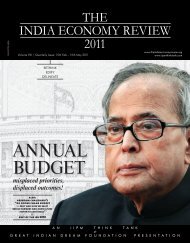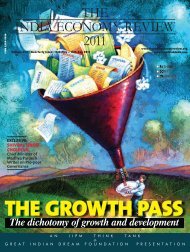Download - The India Economy Review
Download - The India Economy Review
Download - The India Economy Review
Create successful ePaper yourself
Turn your PDF publications into a flip-book with our unique Google optimized e-Paper software.
P LANNING P ARADIGM<br />
It is a moot question whether the<br />
Commission can be transformed into<br />
a Systems Reform Commission<br />
This has long term implications for In-<br />
dia’s teaming millions and brings into<br />
focus the issue of “measurable growth<br />
and meaningful growth”.<br />
<strong>The</strong> <strong>India</strong>n economy whose production<br />
base was broadened and increased by rise<br />
in demand from domestic consumers,<br />
during the fi rst four decades of planned<br />
development has certainly received in-<br />
creased trade benefi ts from the external<br />
orientation of policy and programmes in<br />
the recent years. Along with these benefi ts<br />
came the unavoidable impact of global<br />
fi nancial meltdown in 2008-09. While the<br />
nation benefi ted from the circumspect<br />
policies pursued in capital account and<br />
current account convertibility in moderat-<br />
ing the impact of fi nancial melt down, the<br />
downturn in major economies has cer-<br />
tainly affected trade and is now having a<br />
lagged effect on domestic employment<br />
and income growth. This should be kept<br />
in view while we discuss measures to sustain<br />
high growth rate in the economy and<br />
consider steps to protect different sections<br />
of society.<br />
Conclusions<br />
While the sharp increase in the plan outlays<br />
at the centre and the states have become<br />
noticeable, there is continuing<br />
concern over the issues of equity in redistribution<br />
of resources and effi ciency in<br />
utilization of resources, particularly, in<br />
determining the respective shares of various<br />
states in federal transfers. Public Finance<br />
analysts have pointed out that resolving<br />
tension between equity and<br />
effi ciency is a fundamental challenge in<br />
66 THE IIPM THINK TANK<br />
public policy. In the federal context, this<br />
creates a dilemma for those interested in<br />
the task of adjucating the transfer of federal<br />
funds to the states.<br />
What is signifi cant and should not be<br />
missed by any one is that in <strong>India</strong>, the<br />
pressures of economic growth and fi nancial<br />
management are inextricably intertwined<br />
with social and political objectives<br />
of governance. Rate of growth is to be assessed<br />
along with its quality, and distribution<br />
equity. That has been the sheet anchor<br />
of our development planning. Reiterating<br />
this, in his address to the nation on June<br />
25th 2004, the Prime Minister Dr. Manmohan<br />
Singh had observed that “Equity<br />
and effi ciency are complementary, not<br />
contradictory, and we must move forward<br />
on both these, while maintaining a high<br />
degree of fi scal and fi nancial discipline<br />
and a robust external, economic profi le”.<br />
<strong>The</strong> Prime Minister also observed that “at<br />
a regional level the disparities are high and<br />
while some regions of the country seem to<br />
be on an accelerating growth path, there<br />
is a concern that other regions are not only<br />
lacking but are also falling behind” and<br />
that “as a nation we cannot accept such<br />
disparities”.<br />
Makeover of<br />
Planning Commission?<br />
Given the benefi t of experience of formulation<br />
and implementation of development<br />
plans of over six decades, we should<br />
be ready to consider various suggestions<br />
for a makeover of the Planning Commission,<br />
in so far as its contribution to the<br />
sustained and inclusive growth of the<br />
economy. It is however a moot question<br />
whether the Planning Commission can be<br />
transformed into a Systems Reform Commission<br />
for resolving the extant systemic<br />
problems as proposed by some. For one<br />
thing the Planning Commission as it is<br />
constituted now, lacks statutory stature<br />
and its present composition with a dominance<br />
of Delhi based and Union centric<br />
economists and bureaucrats does not lend<br />
it much credibility. On the other hand<br />
there are genuine apprehensions among<br />
States regarding the content and quality<br />
of its prescriptions. This in itself may be<br />
a good ground for the makeover of the<br />
Planning Commission. However timing<br />
acquires signifi cance. At a time when<br />
questions are raised about the domains of<br />
the Constitutionally empowered Judiciary<br />
the Legislature and Executive and<br />
there is an overhang of uncertainty, the<br />
scope for Planning Commission to metamorphose<br />
itself into a Systems Reform<br />
Commission must be considered limited,<br />
unless the nation is got prepared and<br />
ready to effect Constitutional amendments.<br />
That does not appear to be visible<br />
on the horizon.<br />
(<strong>The</strong> views expressed in the write-up are<br />
personal and do not reflect the offi cial<br />
policy or position of the organization.)





